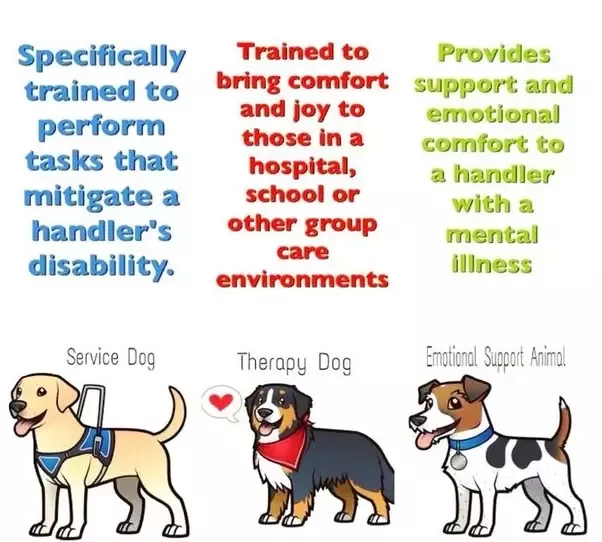What is a Service Animal?
An animal that is individually trained to perform work or tasks for the benefit of a person with a disability. May accompany person with disability to facilities open to public (dog and miniature horse only); housing; airplanes; buses, trains, taxis, Ubers (dogs only); workplace; passenger ship (dogs only); schools and colleges (dog and miniature horse only).

Under Title III of the ADA, a service animal is a dog that has been individually
trained to perform work or tasks that assist an individual with a disability.
A few examples of tasks that service animals can perform are pulling a
wheelchair, assisting an individual during a seizure, and helping individuals
with psychiatric or neurological disabilities by preventing or interrupting
impulsive or destrucive behavior.
Assistance Animals
- Any animal that works, provides assistance, or performs tasks for the benefit of a person with a disability, or provides emotional support that alleviates one or more identified symptoms or effects of a person’s disability,” as defined by the ADA.4 “Individuals with a disability may be entitled to keep an assistance animal as a reasonable accommodation in housing facilities that otherwise impose restrictions or prohibitions on animals. In order to qualify for such an accommodation, the assistance animal must be necessary to afford the individual an equal opportunity to use and enjoy a dwelling or to participate in the housing service or program. Further, there must be a relationship, or nexus, between the individual’s disability and the assistance the animal provides. If these requirements are met, a housing facility, program or service must permit the assistance animal as an accommodation, unless it can demonstrate that allowing the assistance animal would impose an undue financial or administrative burden or would fundamentally alter the nature of the housing program or services.”
Therapy Animals
- Therapy dogs also receive training but have a completely different type of job from service dogs. Their responsibilities are to provide psychological or physiological therapy to individuals other than their handlers. These dogs have stable temperaments and friendly, easy-going personalities. Typically, they visit hospitals, schools, hospices, nursing homes and more. Unlike service dogs, therapy dogs are encouraged to interact with a variety of people while they are on-duty including petting the therapy dog.
Support Animals
- Emotional support animals (ESAs) refer to dogs and other pets that provide emotional support and comfort to their owners on a daily basis. ESAs legally must be prescribed by a licensed mental health professional like a therapist, psychologist, or psychiatrist.
- Emotional support animals differ from service dogs in a few key ways. Service dogs have been trained to perform specific tasks for individuals, and as such, as usually granted access to anywhere their owner goes. Emotional support animals do not require any specific training, although owners should make sure they’re well-trained in public. ESAs are not granted access to establishments such as restaurants or malls like service dogs are.